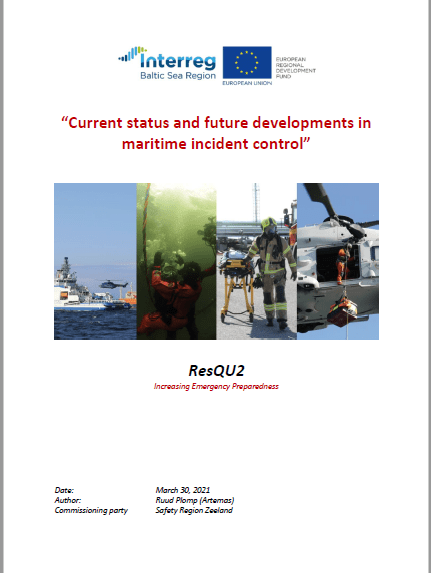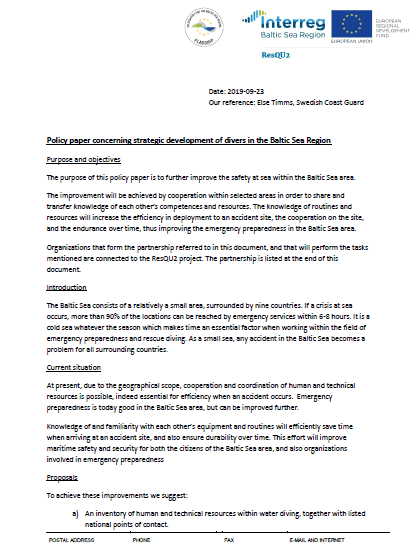ResQU2
Challenging navigation on the Baltic Sea
The amount of maritime traffic is constantly growing; more chemicals are being transported and the number of passengers is increasing. The risk of an accident exists: in the worst-case scenario, a chemical tanker collides with a passenger ship. Hazardous materials are stored in or transported through ports, nearby where a large number of people live. They are at risk of being affected by the consequences of an accident, such as toxic clouds or smoke spreading through the air.
Learning from experiences and guidelines
There is a number of existing guidelines, procedures and lessons learned from previous incidents. What is missing though is knowledge exchange among national rescue authorities around the Baltic and North Sea areas. ResQU2 project platform wanted to fill this gap by raising awareness of the existing procedures and putting them into practice.
Joint guidelines ensure efficient cooperation
In addition, large-scale rescue operations are often joint efforts of several countries. In order for the authorities to efficiently cooperate in these rescue operations, they need to train together. This was another challenge that the ResQU2 platform met. Joint exercises enabled to test the procedures and build a necessary network for future joint actions.
Projects represented in the platform
- Interreg Baltic Sea Region: ChemSAR | HAZARD | DiveSMART Baltic
- DG ECHO (Union Civil Protection Mechanism): MIRG-Ex
Budgets
in numbers
-
0.99MillionTotal
-
0.76MillionErdf
-
0.00MillionEni + Russia
-
0.00MillionNorway
Achievements
Better prepared for emergency situations
The ResQU2 platform helped hundreds of rescue professionals to increase their preparedness for emergency situations at sea and in seaports and to coordinate search-and-rescue operations in the Baltic Sea more efficiently. The partners took best practices from the maritime safety projects of Interreg Baltic Sea Region and coupled them with the knowledge of the project from the EU Civil Protection Mechanism.
Sharing best practices on safety and security management
Through events, peer-to-peer learning, staff exchanges, and joint training sessions, the platform partners shared best practices on safety and security management in ports, risk and crisis communication, rescue operations at sea and in ports. These practices could be used in different circumstances, for example, when human lives were in danger or when chemicals were involved in a maritime incident. Many different authorities and services benefited from these learning exercises: emergency, fire and rescue services, border and coast guards, police, ministries of interior, and agencies dealing with safety and security issues around the Baltic Sea region and beyond. The partners also worked with the coordinators of the EUSBSR policy areas Safe and Secure.
New coordination group for divers
The platform helped formalise cooperation in emergency preparedness and rescue diving in the region. National and regional rescue authorities involved in the platform set up an international coordination group and signed a policy paper outlining the strategic development of divers in the Baltic Sea region. This coordination group helps utilise the scarce rescue resources in the best way for saving lives in the Baltic Sea. The organisations committed to the group are the Finnish Border Guard, Polish Navy, Hamburg Fire and Rescue Department, Fire and Rescue Department of Lithuania, Latvian Navy, Safety Region Zeeland, Swedish Fire Department (Stockholm), and Swedish Navy. The rescue diving was a pilot case for the partners to test out the approach and policy paper. Its suggestions may serve as guidance for setting up cooperation and coordination within other search-and-rescue activities.
Further, the platform looked into what could be done to further improve emergency preparedness: for example, by strengthening networking among international knowledge teams and expert groups, developing a mutual emergency response capacity, and enhancing information management.
Network is the key
All in all, the authorities and services emphasised the importance of shared procedures and trust that were at the core of the participating projects and the ResQU2 platform. One of the most valued outcomes of the platform was the possibility to get to know peers and their resources in other regions and countries. This was the knowledge that may help save lives one day.
Outputs
Current status and future developments in maritime incident control

Policy paper on the strategic development of divers in the Baltic Sea region

Project Stories
-
10.06.2021
Better prepared for emergencies thanks to Interreg
With an average of 300 accidents per year, as reported by the Baltic Marine Environment Protection Commission’s (HELCOM), the Baltic Sea seems to be a challenging area for navigation. The ResQU2 platform has reinforced the preparedness of rescue authorities, services, seaports and other authorities for large-scale incidents in the Baltic Sea.Read full story -
30.09.2020
Great project pictures that tell great Interreg stories!
More than seventy pictures competed in the Interreg Baltic Sea Region photo competition. Which projects were the best in illustrating transnational cooperation, grasping the essence of a project and its result, and presenting the 30th anniversary of Interreg? Congratulations to the teams of BalticRIM, RESQU2, Baltic Game Industry, EcoDesign Circle and GoSmart BSR!Read full story -
24.10.2019
What municipalities and cities get out of Interreg projects
Interreg is all about the regional development of municipalities and cities. Every tenth project partner in projects funded by Interreg Baltic Sea Region is a local public authority, i.e. an institution involved in governing a municipality or city. But why exactly do they participate in cooperation projects?Read full story -
20.12.2016
ChemSAR presents safety operations at sea to commission Vice-President and commissioner
The Vice-President of the European Commission Jyrki Katainen and the Commissioner of Regional Policies Corina Creţu paid a field visit to one of Interreg Baltic Sea Region’s projects, ChemSAR, to observe transnational cooperation in safety operations at sea.Read full story -
20.12.2016
Coping with emergencies at seaports
1,000 kg of ammonia was accidentally released into the atmosphere. The incident took place at the warehouse in the Port of Turku and caused a real threat to the workers and people waiting for the ferry at the nearby Tallink Silja passenger terminal.Read full story -
20.12.2016
Fight against contamination: Hazard in Hamburg
An inland waterway vessel collides with a tanker causing an oil leek and release of huge quantities of sulfur dioxide into the atmosphere. Apart from the crews, 75 people working at the nearby refinery get affected and flee the area leaving an open radioactive source behind. Contamination as a possible danger in seaports was picked up by the HAZARD project to exercise procedures, communication, and cooperation among rescue services, local authorities and private companies.Read full story
Partners
University of Turku
- TownTURKU
- RegionVarsinais-Suomi
- CountryFinland
- RepresentativeKirsi Laitio
- Phone
- E-Mail
- Web
The Finnish Border Guard
- TownHelsinki
- RegionHelsinki-Uusimaa
- CountryFinland
- RepresentativeSeppo Häkkinen
- Phone
- E-Mail
- Web
Southwest Finland Emergency Services
- TownTurku
- RegionVarsinais-Suomi
- CountryFinland
- RepresentativeTorbjörn Lindström
- Phone
- E-Mail
- Web
““SUCCEEDED BY PP11 (01012019)”” Fire and Rescue Board of Klaipeda County
- TownKlaipėda
- RegionKlaipėdos apskritis
- CountryLithuania
- RepresentativeMindaugas Kruopys
- Phone
- E-Mail
- Web
Estonian Police and Border Guard Board
- TownTallinn
- RegionPõhja-Eesti
- CountryEstonia
- RepresentativeMarge Kohtla
- Phone
- E-Mail
- Web
Swedish Coast Guard
- TownKarlskrona
- RegionBlekinge län
- CountrySweden
- RepresentativeElse Timms
- Phone
- E-Mail
- Web
Hamburg Ministry of the Interior and Sports
- TownHamburg
- RegionHamburg
- CountryGermany
- RepresentativeJürgen Krempin
- Phone
- E-Mail
- Web
Safety Region Zeeland
- TownMiddelburg
- RegionOverig Zeeland
- CountryNetherlands
- RepresentativeJeroen Zonnevijlle
- Phone
- E-Mail
- Web
The Naval Academy
- TownGdynia
- RegionGdański
- CountryPoland
- RepresentativeRyszard Kłos
- Phone
- E-Mail
- Web
Latvian Maritime Academy
- TownRiga
- RegionRīga
- CountryLatvia
- RepresentativeAndrejs Zvaigzne
- Phone
- E-Mail
- Web
Fire and Rescue Department of Lithuania
- TownVilnius
- RegionVilniaus apskritis
- CountryLithuania
- RepresentativeMindaugas Kruopys
- Phone
- E-Mail
- Web
-
Project managerKirsi LaitioCentre for Maritime Studies, University of Turku
-
Legal representativeLeena ErälinnaUniversity of Turku
-
Financial managerSari TähtinenUniversity of Turku
-
Communication managerMariikka WhitemanUniversity of Turku



